Related Research Articles

Harry Norman Turtledove is an American author who is best known for his work in the genres of alternate history, historical fiction, fantasy, science fiction, and mystery fiction. He is a student of history and completed his Ph.D. in Byzantine history. His dissertation was on the period AD 565–582. He lives in Southern California.

Colonization is a trilogy of alternate history books by American writer Harry Turtledove. It is a series continuation of the situation set up in the Worldwar tetralogy, projecting the situation between humanity and The Race nearly twenty years afterward, in the mid-1960s.
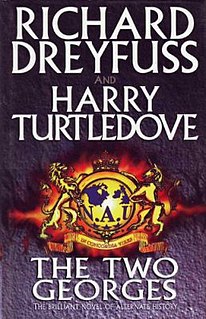
The Two Georges is an alternate history and detective thriller novel co-written by science fiction author Harry Turtledove and Oscar-winning actor Richard Dreyfuss. It was originally published in 1995 by Hodder & Stoughton in the United Kingdom, and in 1996 by Tor Books in the United States, and was nominated for the 1995 Sidewise Award for Alternate History.
"The Last Article" (1988), is an alternate history short story by Harry Turtledove.

American Empire: The Center Cannot Hold is the second book in the American Empire alternate history series by Harry Turtledove. It takes place during the period of the Roaring Twenties and the Great Depression. During this era in Turtledove's Southern Victory world, the Confederate States of America, stretching from Sonora to Virginia, is led by Whigs while the United States of America is controlled by Socialists.

The Great War: Breakthroughs is the third and final installment of the Great War trilogy in the Southern Victory series of alternate history novels by Harry Turtledove. It takes the Southern Victory Series to 1917.
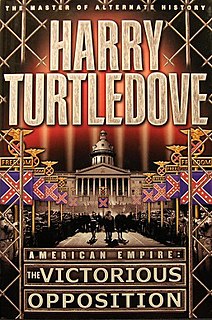
American Empire: The Victorious Opposition is the third and final book in the American Empire alternate history series by Harry Turtledove, and the seventh in the Southern Victory series of books.

Crosstime Traffic is a series of books by Harry Turtledove.
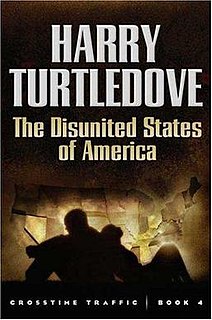
The Disunited States of America is an alternate history novel by Harry Turtledove. It is a part of the Crosstime Traffic series, and takes place in an alternate world where the U.S. was never able to agree on a constitution and continued to govern under the Articles of Confederation. By the early 1800s, the nation dissolved with each state as a separate country. The states trade with each other, engage in diplomacy, and even go to war with each other. Other states exist which do not in our world, such as Boone.

Curious Notions is an alternate history novel by Harry Turtledove. It is a part of the Crosstime Traffic series. In Curious Notions, the Central Powers won World War I prior to the United States entering the war. Subsequently, the German Empire invaded and conquered the United States in the 1950s. The story is set 150 years later, in German-occupied San Francisco. The main plot deals with time travelers from our universe establishing an electronics shop in San Francisco, coming under the suspicion of both the German authorities and the Tongs while preventing the Germans from duplicating the time travel technology.
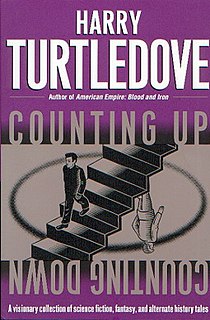
Counting Up, Counting Down is a collection of short stories by Harry Turtledove, most of which were first published in various fiction magazines in the 1990s. It is named after two of the stories appearing in the book, one called "Forty, Counting Down" and the other named "Twenty-One, Counting Up", which are united by the character of Justin Kloster. The story genres represented include alternate history, time travel, fantasy, straight historical fiction, and more. Two story, "The Decoy Duck" and "The Seventh Chapter," are set in the Videssos Universe, with the former story being set before any of the other stories and books in that universe. The book was originally published by Del Rey as a trade paperback in January 2002. In the same month, it was brought out as a leatherbound limited edition by Easton Press.
The War That Came Early is a six-novel series by Harry Turtledove depicting an alternate history of World War II. As is typical of Turtledove's alternate histories, the narrative follows a large cast of both fictional and historical characters.

Joe Steele is an alternate history novel by Harry Turtledove, first published by ROC Books/New American Library in hardcover and ebook form in April 2015. It is an expanded version of the author's 2003 short story of the same name.
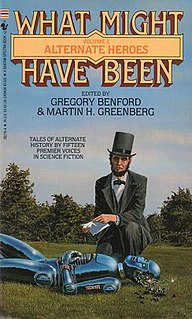
Alternate Heroes is an anthology of alternate history science fiction short stories edited by Gregory Benford and Martin H. Greenberg as the second volume in their What Might Have Been series. It was first published in paperback by Bantam Spectra in January 1990, and in trade paperback by BP Books in June 2004. It was also gathered together with Alternate Empires into the omnibus anthology What Might Have Been: Volumes 1 & 2: Alternate Empires / Alternate Heroes.
"Liberating Alaska" is an alternate history short story by Harry Turtledove, published in the July/August 2018 issue of the Isaac Asimov's Science Fiction Magazine.
"Zigeuner" is a science fiction short story by Harry Turtledove, first published in the September/October issue of Asimov's Science Fiction Magazine in August, 2017. It was reprinted in The Year's Best Science Fiction: Thirty-Fifth Annual Collection, Gardner Dozois, ed. St. Martin's, 2018. It won the Sidewise Award for Alternate History for best short form work in 2018. It would also be reprinted in Turtledove's short-story collection The Best of Harry Turtledove in 2021.
Lee at the Alamo is an alternate history short story by Harry Turtledove. It was published online at tor.com on September 7, 2011.
Atlantis is an alternate history series written by Harry Turtledove. The point of divergence occurs around 85 million years ago when the eastern portion of the North American continent splits off from the rest of the continent and forms Atlantis, a separate continent farther east in the Atlantic Ocean.

Atlantis and Other Places is a collection of short stories by Harry Turtledove. Published by Roc Books in December 2010, the collection includes two stories from Turtledove's Atlantis series Audubon in Atlantis and The Scarlet Band along with 10 other unrelated stories.
Bibliography of science fiction, fantasy, historical fiction and nonfiction writer Harry Turtledove:
References
- ↑ "Uchronia: Uncle Alf". www.uchronia.net.
- ↑ "Uchronia: Atlantis and Other Places". www.uchronia.net.
- ↑ "Steven H. Silver.com: Harry Turtledove short stories". www.stevenhsilver.com.